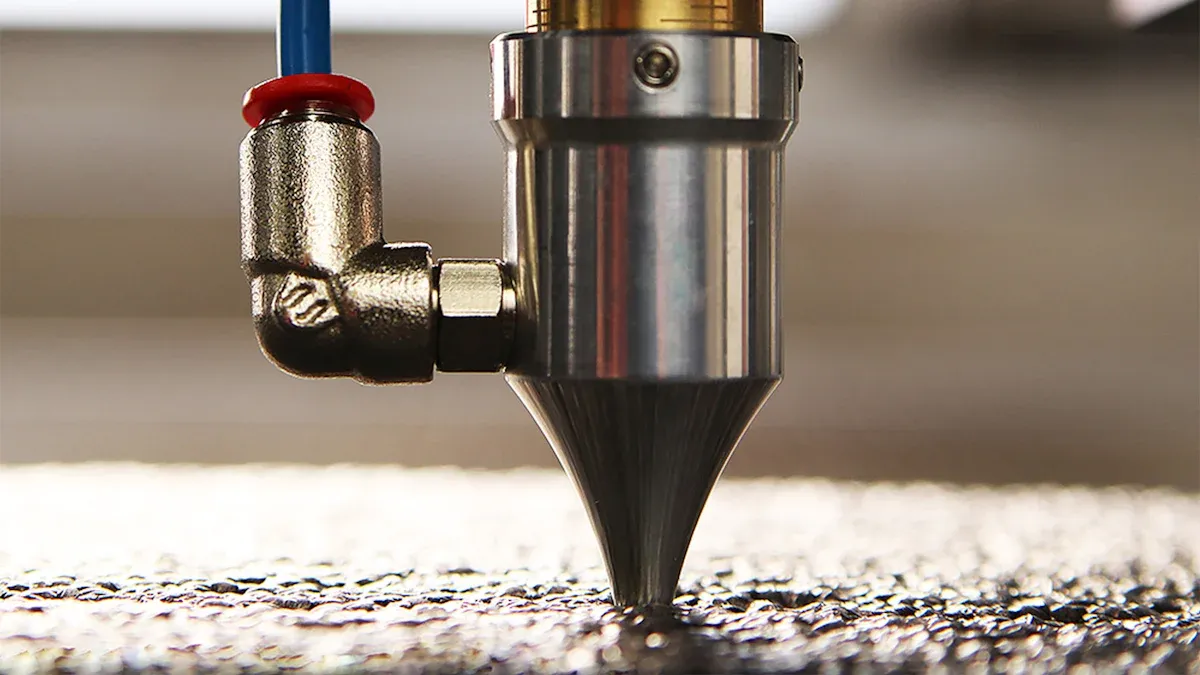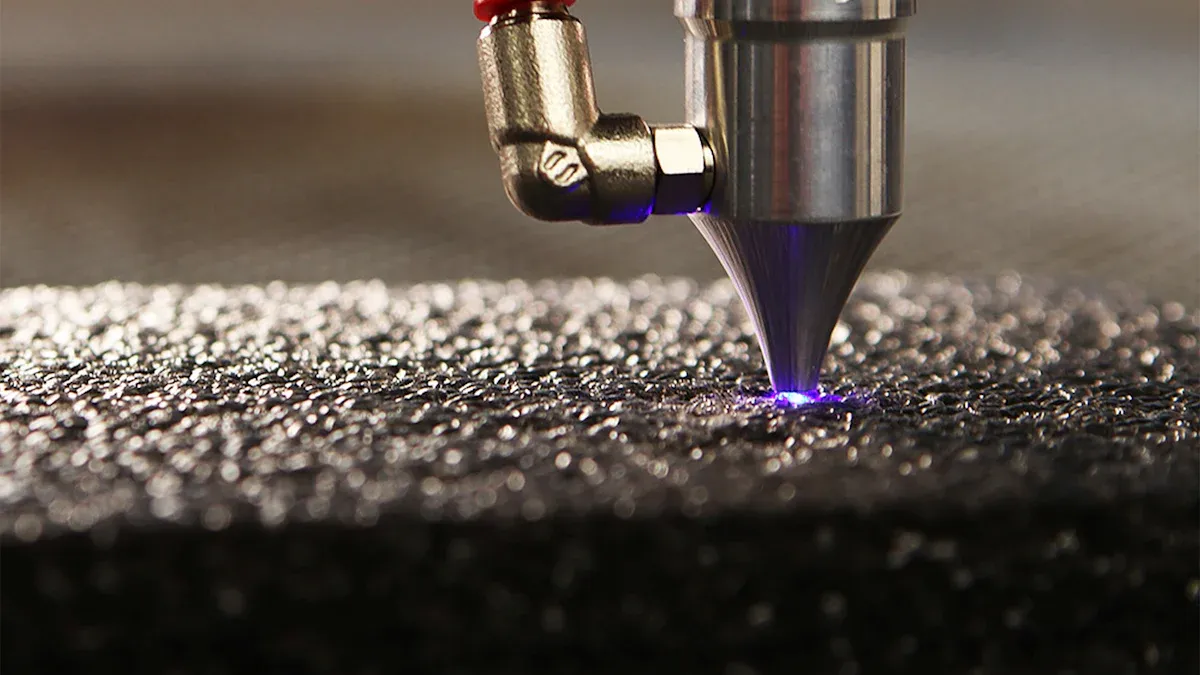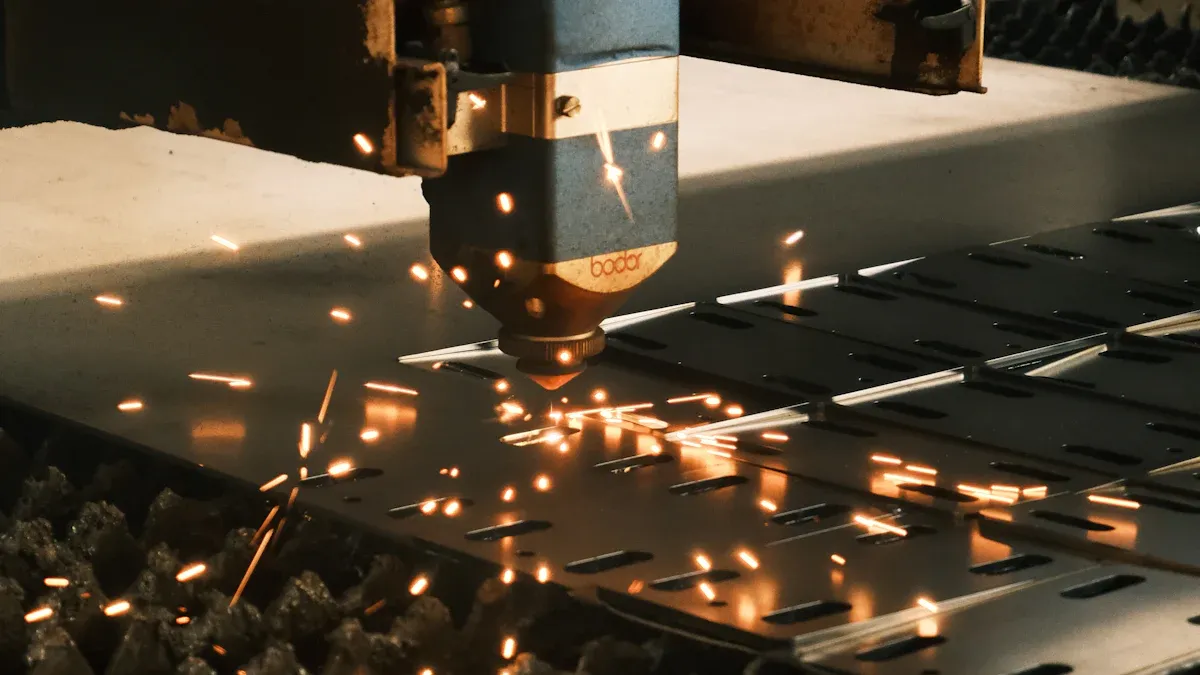What Makes Laser Cutting Ideal for Nickel-Titanium in Medical Devices

Laser cutting offers unmatched precision and efficiency in manufacturing nickel-titanium medical devices. This advanced technology ensures cutting accuracies of ±0.05 mm, enabling the creation of intricate designs essential for medical applications. The localized heat minimizes heat-affected zones, preserving the material's shape memory and superelasticity. Unlike traditional methods, laser cutting reduces mechanical stress, maintaining the performance and quality of nickel-titanium. Its ability to handle complex geometries makes it indispensable in medical device manufacturing, where reliability and biocompatibility are critical. These features ensure that devices meet stringent industry standards while supporting innovative designs.
Key Takeaways
Laser cutting is very precise, with accuracy up to ±0.05 mm. This is important for making detailed medical device designs.
It causes less heat damage, keeping nickel-titanium's special traits like shape memory and flexibility.
Laser cutting lowers physical stress on parts, keeping devices strong and working well.
The method is fast and saves money by reducing time and material waste. This helps lower production costs.
It also allows quick changes and custom designs, helping make medical devices fit patients' needs.
The Unique Properties of Nickel-Titanium

Shape Memory and Superelasticity
Nickel-titanium, commonly referred to as nitinol, exhibits remarkable shape-memory and superelasticity properties. These characteristics make it indispensable in medical device manufacturing. Shape-memory allows nitinol to return to its original form after deformation when exposed to a specific temperature. This property is particularly useful in devices like stents, which expand to restore blood flow once inside the body. Superelasticity enables nitinol to endure significant strain without permanent deformation, making it ideal for applications requiring flexibility, such as guidewires and orthodontic brackets.
Medical professionals rely on these unique properties to create devices that adapt to the human body. For instance, nitinol stents expand at body temperature, ensuring precise placement and functionality. Similarly, orthodontic wires made from nitinol apply consistent force to teeth, improving treatment outcomes. These applications highlight the material's versatility and its ability to enhance patient care.
Biocompatibility and Corrosion Resistance
Nitinol's biocompatibility and corrosion resistance are critical for its use in medical devices. When treated to form a protective titanium dioxide (TiO2) layer, nitinol resists corrosion and prevents nickel release. This ensures safety for patients, even those with nickel sensitivities. Clinical studies confirm that patients with and without nickel allergies experience similar outcomes, demonstrating nitinol's reliability in diverse medical scenarios.
This corrosion resistance also extends the lifespan of devices, reducing the need for replacements. From intrauterine devices to neurovascular tools, nitinol's biocompatibility ensures it integrates seamlessly with the human body. Its ability to withstand harsh bodily environments makes it a preferred choice for long-term implants and surgical tools.
Challenges in Machining Nickel-Titanium
Despite its advantages, machining nickel-titanium presents unique challenges. The material's phase transformations and temperature sensitivity complicate the process. When heated above the austenite start phase temperature, nitinol becomes harder to machine. This often results in thicker burrs during processing, especially in martensitic alloys. Controlling temperature is essential to maintain machinability. Techniques like using chilled air help prevent phase transitions, ensuring smoother machining.
AccuPath specializes in overcoming these challenges by leveraging advanced laser cutting technology. Their expertise ensures precise machining of nickel-titanium tubes, preserving the material's unique properties while delivering high-quality results. This capability supports the production of intricate and reliable medical devices, meeting the industry's stringent standards.
Benefits of Nitinol Laser Cutting
Precision and Accuracy
Nitinol laser cutting offers unparalleled precision and accuracy, making it the preferred method for processing nickel-titanium components. This high degree of precision is essential for creating intricate medical devices with complex geometries and precise dimensions. Studies from industry leaders like AMETEK and GTI Medical highlight laser cutting's ability to achieve cutting precision unmatched by traditional methods. For example, micro laser cutting ensures clean, accurate cuts, which are critical for devices like stents and guidewires.
The precision cutting techniques used in nitinol laser cutting also reduce the need for post-processing. This efficiency not only saves time but also ensures consistent quality across all components. AccuPath leverages advanced laser technology to deliver precise results, meeting the stringent requirements of medical device manufacturing.
Minimal Heat-Affected Zones
Laser cutting minimizes thermal damage, preserving the unique properties of nitinol, such as shape memory and superelasticity. The localized heat generated by the laser ensures minimal thermal impact, which is crucial for maintaining the alloy's performance. Unlike traditional methods, laser processing avoids excessive heat exposure, preventing alterations to the material's structure.
Thermal analysis confirms that nitinol laser cutting produces minimal heat-affected zones. The controlled nature of the laser beam ensures that the material's integrity remains intact, even during intricate cutting processes. This capability makes laser cutting ideal for applications requiring high precision and minimal thermal damage, such as vascular implants and orthodontic devices.
Reduced Mechanical Stress
Nitinol laser cutting significantly reduces mechanical stress on components compared to conventional cutting methods. Traditional machining often introduces stress that can compromise the material's functional properties. In contrast, laser cutting employs non-contact processing, eliminating physical force and ensuring the material's structural integrity.
Mechanical testing reports validate that laser cutting preserves the performance of nitinol components. By avoiding mechanical deformation, this method ensures that devices retain their shape memory and superelasticity. AccuPath's expertise in nitinol processing guarantees high-quality results, making it a trusted partner for medical device manufacturers.
Efficiency and Cost-Effectiveness
Nitinol laser cutting offers unmatched efficiency and cost-effectiveness in medical device manufacturing. The process eliminates the need for multiple machining steps, reducing production time significantly. By using advanced laser technology, manufacturers can achieve precise cuts in a single operation. This streamlined approach minimizes material waste, which lowers overall costs.
The non-contact nature of laser cutting further enhances efficiency. Unlike traditional methods, it does not require tool changes or frequent maintenance. This reduces downtime and ensures consistent performance throughout the production cycle. Studies show that laser cutting can increase production rates by up to 30%, making it a preferred choice for high-volume manufacturing.
AccuPath leverages state-of-the-art laser systems to deliver cost-effective solutions for nitinol components. Their expertise ensures that every cut meets the highest standards of precision and quality. By optimizing the cutting process, AccuPath helps medical device manufacturers save time and resources while maintaining exceptional results.
Tip: Investing in nitinol laser cutting not only reduces costs but also improves the overall efficiency of medical device production.
Customization and Prototyping
Nitinol laser cutting excels in customization and prototyping, enabling manufacturers to create intricate designs tailored to specific medical applications. The precision of laser technology allows for the production of complex geometries that would be challenging with traditional methods. This capability is essential for developing innovative devices like stents, guidewires, and surgical tools.
Prototyping with laser cutting offers unparalleled flexibility. Engineers can quickly test and refine designs without incurring high costs. The ability to make rapid adjustments ensures that prototypes meet exact specifications before moving to full-scale production. This accelerates the development process and reduces time-to-market for new medical devices.
AccuPath specializes in providing customized nitinol solutions for medical device manufacturers. Their advanced laser systems support the creation of prototypes with exceptional accuracy and detail. By partnering with AccuPath, companies can bring their innovative ideas to life while maintaining the highest standards of quality and reliability.
Note: Customization through nitinol laser cutting ensures that medical devices meet the unique needs of patients and healthcare providers.
Applications of Nickel-Titanium Tube Laser Cutting in Medical Devices

Stents and Vascular Implants
Nickel-titanium tube laser cutting plays a vital role in manufacturing stents and vascular implants. These devices require exceptional precision to meet the tight tolerances necessary for cardiovascular applications. Femtosecond laser technology achieves cutting accuracies of ±0.05 mm, ensuring the intricate designs of stents are produced with unmatched reliability. The minimal thermal damage from laser cutting preserves the material's shape memory and superelasticity, which are essential for stents to expand and restore blood flow effectively.
AccuPath specializes in crafting high-quality stents using advanced laser cutting techniques. Their expertise ensures that each stent meets the stringent requirements of the medical industry. By leveraging nickel-titanium tube laser cutting, AccuPath delivers stents that enhance patient outcomes and support minimally invasive procedures.
Guidewires and Catheters
Guidewires and catheters benefit significantly from nickel-titanium tube laser cutting. These devices demand biocompatibility, flexibility, and precision to navigate the human body safely. Nickel-titanium's shape memory allows guidewires to return to their original form after deformation, while its superelasticity enables them to endure significant strain without damage. These properties make nickel-titanium ideal for guidewires and catheters used in delicate medical procedures.
Laser cutting ensures the precise fabrication of these devices, maintaining their structural integrity and performance. AccuPath's advanced laser systems produce guidewires with exceptional accuracy, supporting their use in minimally invasive surgeries. This capability highlights the importance of nickel-titanium tube laser cutting in creating reliable and effective medical devices.
Surgical Instruments and Tools
Surgical instruments and tools crafted from nickel-titanium benefit from the precision of laser cutting. This process enhances the manufacturing of orthopedic devices, dental archwires, and neurovascular tools. For example, bone anchors and embolic coils require precise cuts to ensure stability and functionality during surgical procedures. Laser cutting achieves this level of accuracy, making it indispensable for producing high-performance surgical tools.
AccuPath's expertise in nickel-titanium tube laser cutting ensures that surgical instruments meet the highest standards of quality and reliability. Their advanced technology supports the creation of tools that improve surgical outcomes and patient care. By utilizing laser cutting, AccuPath continues to lead in the production of innovative medical devices.
Orthodontic and Dental Devices
Orthodontic and dental devices require precision and durability to deliver effective treatment. Nickel-titanium tube laser cutting plays a crucial role in manufacturing these devices. This advanced technology ensures the creation of intricate designs with high accuracy, meeting the specific needs of orthodontic and dental applications.
Orthodontic wires and brackets made from nickel-titanium benefit from the material's shape memory and superelasticity. These properties allow wires to apply consistent force to teeth, improving alignment over time. Nickel-titanium tube laser cutting ensures precise fabrication of these components, maintaining their structural integrity and performance. The process also minimizes thermal damage, preserving the material's unique characteristics.
Dental tools, such as root canal files and archwires, also rely on nickel-titanium for their flexibility and strength. Laser cutting enables the production of these tools with exceptional detail, ensuring they perform effectively in challenging environments. The non-contact nature of laser cutting eliminates mechanical stress, enhancing the durability of these devices.
AccuPath specializes in nickel-titanium tube laser cutting, offering customized solutions for orthodontic and dental device manufacturers. Their advanced laser systems produce components with unmatched precision, supporting innovative designs and improving patient outcomes. By leveraging AccuPath's expertise, manufacturers can create high-quality devices that meet the demands of modern dentistry.
Note: Nickel-titanium tube laser cutting ensures orthodontic and dental devices are both reliable and effective, enhancing the quality of care for patients.
Technological Advancements in Nitinol Laser Cutting
Femtosecond Lasers for Precision
Femtosecond laser technology represents a significant leap in nitinol processing. These lasers operate with ultrashort pulses, enabling precise material removal without excessive heat transfer. This feature is critical for nitinol, as it preserves its shape memory and superelasticity. The ability to create intricate designs makes femtosecond lasers ideal for manufacturing complex medical devices like stents and guidewires.
Femtosecond lasers excel in high-precision material processing.
Minimal heat transfer ensures the integrity of nitinol during cutting.
Intricate designs enhance the functionality of medical devices.
AccuPath utilizes femtosecond laser technology to deliver exceptional results in nitinol tube processing. Their advanced systems ensure precise cuts, supporting the production of reliable and high-quality medical devices.
AI and Automation Integration
Artificial intelligence (AI) and automation are transforming nitinol laser cutting. AI-powered systems analyze cutting parameters in real time, optimizing precision and efficiency. Automation streamlines the production process, reducing human error and ensuring consistent quality. These advancements enable manufacturers to meet the growing demand for intricate medical devices.
AccuPath integrates AI and automation into its advanced laser cutting technology. This approach enhances productivity and ensures that every component meets stringent industry standards. By leveraging these innovations, AccuPath remains at the forefront of nitinol processing.
Sustainability and Energy Efficiency
Sustainability plays a crucial role in modern manufacturing. Nitinol laser cutting aligns with global sustainability goals by reducing energy consumption and material waste. Low-energy lasers minimize power usage, while precise cutting techniques decrease waste generation. These practices contribute to a more environmentally friendly production process.
Aspect | Benefit |
|---|---|
Energy Efficiency | Low-energy lasers reduce power consumption. |
Material Waste | Precise cutting minimizes waste. |
Sustainability Alignment | Practices align with global sustainability goals. |
AccuPath prioritizes sustainability in its operations. Their commitment to energy-efficient practices and waste reduction ensures that their nitinol processing methods are both effective and environmentally responsible.
Innovations in Laser Beam Shaping
Advancements in laser beam shaping have revolutionized the processing of nickel-titanium (nitinol) for medical devices. This technology allows manufacturers to manipulate laser beams with precision, enabling the creation of intricate designs while preserving the material's unique properties. By tailoring the laser beam's intensity and focus, engineers achieve unparalleled accuracy in cutting and shaping nitinol components.
Laser beam shaping offers several technical benefits that enhance the quality of nitinol processing:
Feature | Benefit |
|---|---|
Precision | Enables accurate shaping of complex medical devices. |
Minimal Thermal Damage | Reduces heat impact, preserving nitinol's shape memory and superelasticity. |
Non-Contact Processing | Prevents contamination and tool wear, ensuring cleaner results. |
Versatility | Supports a wide range of applications, streamlining production. |
Speed and Efficiency | Accelerates manufacturing, meeting the demands of medical device production. |
Reduced Post-Processing | Minimizes the need for additional finishing, saving time and resources. |
Customization | Facilitates the creation of patient-specific devices for personalized treatments. |
These innovations are particularly valuable in the medical field, where precision and reliability are critical. For example, laser beam shaping ensures that stents and guidewires meet stringent dimensional requirements. The ability to minimize thermal damage also preserves nitinol's functional properties, which are essential for devices like orthodontic wires and vascular implants.
AccuPath leverages cutting-edge laser beam shaping technology to deliver exceptional results in nitinol processing. Their expertise ensures that every component meets the highest standards of quality and performance. By adopting these advancements, AccuPath supports the production of innovative medical devices that improve patient care and outcomes.
Tip: Manufacturers can achieve superior results by integrating laser beam shaping into their nitinol processing workflows. This approach enhances efficiency while maintaining the integrity of the material.
Future Trends in Laser Cutting for Medical Devices
Smart Manufacturing Technologies
Smart manufacturing technologies are revolutionizing the laser cutting process for medical devices. The integration of IoT-driven solutions allows manufacturers to monitor and adjust laser cutting parameters remotely, ensuring consistent quality and compliance with regulatory standards. This approach enhances precision and reduces errors, making it ideal for producing intricate nitinol components like stents and guidewires. Additionally, automation streamlines production workflows, improving efficiency and reducing costs. For example, laser cutting systems equipped with AI can analyze real-time data to optimize cutting paths, resulting in higher yields and minimal material waste.
AccuPath leverages these advancements to deliver superior results in nitinol processing. Their cutting-edge laser systems incorporate smart technologies, enabling the production of high-quality medical devices with unmatched accuracy. By adopting these innovations, AccuPath supports manufacturers in meeting the growing demand for reliable and biocompatible medical tools.
Material Science Advancements
Recent advancements in material science have significantly enhanced the processing of nitinol for medical devices. Laser cutting technology now enables the creation of intricate designs that traditional methods cannot achieve. This capability is crucial for manufacturing detailed tools like surgical instruments and stents. Micro-cutting technologies, in particular, allow for precise material removal while preserving nitinol's unique properties, such as shape memory and superelasticity.
AccuPath stays at the forefront of these developments by utilizing advanced laser systems tailored for nitinol processing. Their expertise ensures that every component meets stringent industry standards, making them a trusted partner for medical device manufacturers. These material science innovations not only improve device functionality but also accelerate production timelines, benefiting both manufacturers and patients.
Expanding Applications in Minimally Invasive Surgery
Minimally invasive surgical procedures increasingly rely on laser-cut nickel-titanium components. The precision of laser cutting allows for the creation of implants with closely spaced struts, essential for devices like stents and orbital floor implants. This level of detail ensures optimal performance without compromising the design. Nitinol's shape memory and flexibility further enhance its suitability for minimally invasive applications, enabling devices to adapt seamlessly to the human body.
AccuPath specializes in producing laser-cut nitinol components for minimally invasive surgeries. Their advanced technology ensures minimal kerf and thermal damage, preserving the material's integrity. By supporting the development of innovative surgical tools, AccuPath plays a vital role in advancing patient care and outcomes.
Tip: Manufacturers can stay competitive by adopting laser cutting technologies that support the growing demand for minimally invasive medical devices.
Laser cutting has revolutionized the manufacturing of nickel-titanium medical devices by combining precision, efficiency, and adaptability. This advanced technology ensures intricate designs are produced with exceptional accuracy, preserving the unique properties of nickel-titanium, such as shape memory and superelasticity. The process minimizes material waste, reduces thermal damage, and enhances overall performance, making it indispensable for creating high-quality stents, guidewires, and surgical tools.
Key Benefits of Laser Cutting for Nickel-Titanium:
Precision Material Utilization: Achieves cutting accuracies of ±0.1 mm, reducing scrap rates by up to 30%.
Tooling-Free Production: Eliminates physical tooling, lowering setup costs and enabling cost-effective production.
Optimized Power Consumption: Modern systems consume 50-70% less energy than traditional CO2 lasers.
AccuPath leverages cutting-edge laser systems to deliver reliable and efficient solutions for medical device manufacturing. Their expertise ensures every component meets the highest standards of quality and performance, supporting the development of innovative devices that improve patient care.
Note: With continuous advancements in laser cutting technology, manufacturers can expect even greater efficiency and precision in the future.
FAQ
What makes laser cutting superior for nickel-titanium medical devices?
Laser cutting offers unmatched precision and minimal thermal damage, preserving nickel-titanium's shape memory and superelasticity. This ensures high-quality components for medical devices. AccuPath's advanced laser systems deliver exceptional results, meeting stringent industry standards and supporting innovative designs.
How does AccuPath ensure the quality of laser-cut nickel-titanium components?
AccuPath uses state-of-the-art laser technology and rigorous quality control processes. Their expertise guarantees precise cuts, minimal material waste, and consistent performance. This ensures that every component meets the highest standards required for medical device manufacturing.
Can laser cutting handle complex geometries in medical devices?
Yes, laser cutting excels at creating intricate designs with high accuracy. AccuPath specializes in producing complex nickel-titanium components, such as stents and guidewires, ensuring they meet the precise requirements of medical applications.
Is laser cutting cost-effective for medical device production?
Laser cutting reduces production time, minimizes material waste, and eliminates the need for physical tooling. AccuPath's efficient processes lower costs while maintaining exceptional quality, making it a cost-effective solution for medical device manufacturers.
Why is nickel-titanium ideal for minimally invasive surgical tools?
Nickel-titanium's shape memory and superelasticity make it perfect for minimally invasive tools. Laser cutting preserves these properties, ensuring reliable performance. AccuPath's expertise in nickel-titanium processing supports the creation of advanced surgical instruments that improve patient outcomes.
Tip: Partnering with AccuPath ensures access to cutting-edge laser cutting solutions for nickel-titanium medical devices, enhancing both quality and efficiency.

